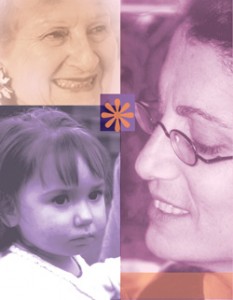Being Jewish
Commentary
Commentary: Mother as a Late Bloomer
 In a renowned biblical love-triangle, a destitute widow cares for her equally destitute mother-in-law, and an elderly rich man falls in love with the daughter because of her love for the mother. (Boaz’s welcome in Ruth 2:11: “I have heard everything you’ve done for your mother-in-law.”) This triangle culminates in a celebration of life’s plenty—harvest time and earth’s renewal and the receiving of the Torah—the festival of Shavuot.
In a renowned biblical love-triangle, a destitute widow cares for her equally destitute mother-in-law, and an elderly rich man falls in love with the daughter because of her love for the mother. (Boaz’s welcome in Ruth 2:11: “I have heard everything you’ve done for your mother-in-law.”) This triangle culminates in a celebration of life’s plenty—harvest time and earth’s renewal and the receiving of the Torah—the festival of Shavuot.
For a long time it seemed to me only a pretty story to be taken with several grains of salt. One day I realized it was happening in my own life.
During my childhood, my mother was given to rages. Possibly to escape them, she fled the house at every opportunity. What she fled to was gambling—card games with high enough stakes so that losses were added rage triggers. Driven to get out every afternoon and often in the evenings, she left my father (who funded her flights) and me in a house that resounded with emptiness. In response, I picked loud fights with her.
One day my aunt blurted out a family secret. My mother had given birth to another child besides me, a stillborn boy. “You ought to forgive her,” she said. “She never got over it.”
At first stunned, I soon welcomed back my grudges. Why hadn’t my mother valued the child who lived and not mourned, lifelong, the one that got away? Must a poor dead baby be hauled in as an excuse? I had broken off with her numbers of times. I felt I would suffocate if I stayed within reach of her voice. When my father begged me to, I came back again—life with her was too hard on him without an ally. Certainly, by the time I had children a final break would come. I would not subject them to what had caused me so much pain.
My mother had kept from me the attachments of her own childhood—she had, as a child, sung in a synagogue choir, watched her mother light Shabbos candles—and deprived me of a heritage rightfully mine. To her, all Jewish tradition was irrelevant, or worse, contemptible, in any case at odds with being American. Ironically, when I began my way back to Jewish studies, I came to see our family as our own version of the Book of Ruth’s story of renewal.
For purely selfish reasons, I lifted the ban on my mother’s visits when my children were born: I needed her help. Then a shocking change came over her. Perhaps the grief of a dead baby had receded, along with the anxieties of being a firstborn child of immigrant parents. Whatever the reasons for the transformation, she somehow was able to crack her shell and step forth into new ways of being. At least that is the image that expresses the change for me.
All through their childhood, my daughter and son adored my mother. And why not? She was generous and attentive, available and open, immensely loving.
Slowly, slowly, I recognized that the childhood of my children was being enriched by a truth utterly different from the one that had marred mine. Strangest of all was this: that what was true for them began to be, in time, true for me as well. It was as if the nourishing umbilical cord that connected me to my children somehow ran back to my mother and from there returned to me.
Nothing of the past was forgotten, and pain is not easily erased. What I can say about what happened is that I came to see my mother as much through the love-strewn lattice of my children’s childhood as through the bitter lens of my own.
Slowly, slowly, I fell in love with my mother because of the goodness and love she showed to my children. H
This essay is part of a work in progress Norma Rosen is writing about the world of her mother.










 Facebook
Facebook Instagram
Instagram Twitter
Twitter
Leave a Reply